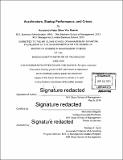Accelerators, startup performance, and crises
Author(s)
Von Bueren, Konstantin Peter Oliver
DownloadFull printable version (9.205Mb)
Other Contributors
Sloan School of Management.
Advisor
Mercedes Delgado.
Terms of use
Metadata
Show full item recordAbstract
New accelerator programs have developed globally over the last decade. The accelerator concept is widely discussed in the media and receives increasing interest from researchers. However, the performance and impact of accelerators is often debated. This paper's objective is to offer a qualitative overview of different accelerator types and empirical analysis of the performance of two popular accelerators: Y Combinator and Techstars. Based on characteristics of the accelerators and the economic environment, this paper presents a first attempt to understand the influence of economic shocks on accelerated startups in the context of the recent Great Recession (2007-2009). Three core findings were identified in this research. First, the death rate of startups accelerated during the recession is significantly greater than of startups accelerated before or after the recession. This finding questions the added value of attending an accelerator program during a recession and calls for crisis-specific initiatives to increase the resilience of the accelerated startups. Second, the scarce VC funding in a location during the crisis is associated with the increased death rates. Third, the two accelerators seem to have changed their business model, increasing the number of later stage startups (i.e., those with prior funding) accepted in their programs.
Description
Thesis: S.M. in Management Studies, Massachusetts Institute of Technology, Sloan School of Management, 2016. Cataloged from PDF version of thesis. Includes bibliographical references (pages 69-72).
Date issued
2016Department
Sloan School of ManagementPublisher
Massachusetts Institute of Technology
Keywords
Sloan School of Management.